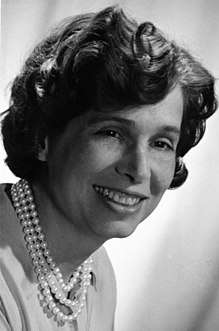Thérèse Gouin Décarie
Thérèse Gouin-Décarie OC OQ FRSC (born September 30, 1923) is a Canadian developmental psychologist and educator living in Quebec. She is known for her work on intellectual and emotional development in young children.[1]
Thérèse Gouin-Décarie | |
|---|---|
 | |
| Born | Thérèse Mercier-Gouin September 30, 1923 Montreal, Quebec, Canada |
| Nationality | Canada |
| Occupation | Psychologist, professor |
Biography
Gouin-Décarie was born in Montreal on September 30, 1923, to Yvette Ollivier, an artist and playwright, and Léon-Mercier Gouin, a lawyer, professor, and Canadian senator.[1][2] She studied psychology at the Université de Montréal, earning a bachelor's degree in 1945 and a master's degree in 1947.[1] She pursued clinical training at the Centre d'orientation in Montreal (1948), at the Children's Center in Boston (1948), and at the Centre médico-pédagogique at the Université de Paris (1948-1949).[2] In 1949, she married the Canadian philosopher Vianney Décarie.[1]
In 1949, Gouin-Décarie returned to teach psychology and complete her dissertation at the Université de Montréal, where she would remain for the rest of her career.[2] She completed her PhD in 1960.[1][2] She earned the title of full professor in 1965 and, after her retirement, professor emeritus in 1991.[2]
Research
Gouin-Décarie conducted research on children's development.[1] Her dissertation, Emotional Intelligence in Young Children, reconciled the developmental theories of Jean Piaget and Sigmund Freud.[1][3] This work was published as Intelligence and Affectivity in Early Childhood, and included a foreword by Piaget.[1][4] It was later translated into several languages.[5]
In the 1960s, Gouin-Décarie led a longitudinal study of children born to mothers who had taken thalidomide during their pregnancy.[2][6] Her work assessed the psychological and emotional health of these children, and received international attention.[5]
Gouin-Décarie's later research examined topics of early social development, including infants' responses to strangers[7] and toddlers' perspective-taking skills[8].
Awards and honours
In 1969, Gouin-Décarie was named a Fellow of the Royal Society of Canada. She was named an Officer of the Order of Canada in 1971. She was named a Distinguished Fellow of the International Society for Infant Study in 1990. In 1994, she was named an Officer of the National Order of Quebec.[9]
In 1988, she was awarded the Prix Léon-Gérin. In 1991, she received the Innis-Gérin Medal from the Royal Society of Canada.[9] She received the Prix Acfas Marcel-Vincent from the Association francophone pour le savoir for her work in the social sciences in 1986; in 2013, the prize was renamed the Prix Acfas Thérèse Gouin-Décarie in her honour.[10]
Publications
- Le développement psychologique de l'enfant., 1953
- De la̕dolescence à la maturité, 1955
- Le fasi della crescita. : Il libro dei genitori., 1964
- Intelligence and affectivity in early childhood; an experimental study of Jean Piaget's object concept and object relations. Foreword by Jean Piaget. Translated by Elisabeth Paszot Brandt and Lewis Wolfgang Brandt., 1965
- De l'Adolescence à la maturité : causeries de Radio-Collège (1953-1954), 1965
- Inteligencia y afectividad en el niño, 1970
- La réaction du jeune enfant à la personne étrangère, par Thérèse Gouin Décarie, en collaboration avec Jacques Goulet [et al.]., 1972
- The enfant's reaction to strangers, 1974
- Perceptual constancy and object permanency, 1975
- Piaget e Freud : Studio sperimentale sull'intelligenza e sulla affettività del bambino, 1976
- Le Griffiths, vingt-cinq ans après sa construction : une réévaluation des 80 premiers items : rapport final, 1981
References
- Young, Jacy L.; Nakhjiri, Zahra (2012). Rutherford, A. (ed.). "Thérèse Gouin-Décarie". Psychology's Feminist Voices. Retrieved 2019-12-01.
- Guertin, Marilyne; Sansfaçon, Mélissa. "Les archives d'une pionnière de la psychologie de l'enfant: Le Fonds Thérèse Gouin-Décarie" (PDF). Université de Montréal, Division de la gestion de documents et des archives. Retrieved 2019-12-01.
- "Université de Montréal - Division de la gestion de documents et des archives - Fonds Thérèse Gouin-Décarie - P330". www.archiv.umontreal.ca. Retrieved 2019-12-02.
- Décarie Gouin, T. (1965). Intelligence and Affectivity in Early Childhood. New York: International Universities Press.
- "Thérèse Gouin Décarie – Ordre national du Québec". www.ordre-national.gouv.qc.ca. Retrieved 2019-12-02.
- Roskies, Ethel (1972). Abnormality and Normality : The Mothering of Thalidomide Children. Ithaca, NY: Cornell University Press. pp. vii. ISBN 978-1-5017-4314-6. OCLC 1121053919.
- Ricard, Marcelle; Gouin Decarie, Therese (1993). "Distance-maintaining in infants' reaction to an adult stranger". Social Development. 2 (2): 145–165. doi:10.1111/j.1467-9507.1993.tb00009.x. ISSN 0961-205X.
- Ricard, Marcelle; Girouard, Pascale C.; Gouin Décarie, Thérèse (1999). "Personal pronouns and perspective taking in toddlers". Journal of Child Language. 26 (3): 681–697. doi:10.1017/S0305000999003943. ISSN 0305-0009. PMID 10603700.
- "Thérèse Gouin-Décarie fonds". University of Ottawa.
- "Prix Acfas Thérèse Gouin-Décarie" (in French). Acfas.